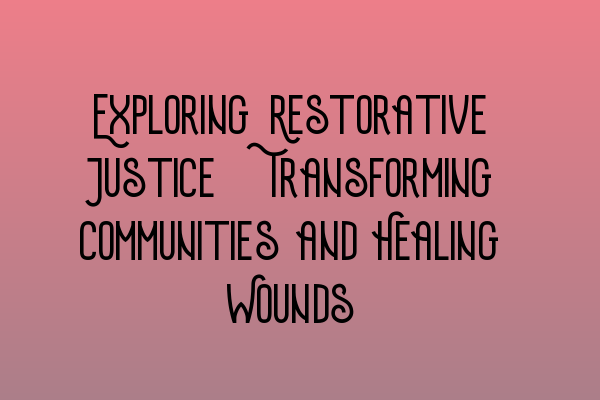Exploring Restorative Justice: Transforming Communities and Healing Wounds
Restorative justice is a transformative approach that aims to bring healing and reconciliation to communities affected by crime. It focuses on repairing the harm caused by an offense and rebuilding relationships between offenders, victims, and the community. In recent years, restorative justice has gained significant attention in criminal law practice in the UK, as it offers an alternative to traditional punitive measures. In this article, we delve into the concept of restorative justice, its benefits, and how it can positively impact our society.
Understanding Restorative Justice
Restorative justice is a process that involves facilitated dialogues between offenders, victims, and other affected community members. Its primary goal is to provide an opportunity for all parties involved to communicate openly, express their needs and concerns, and collectively find solutions that promote healing and accountability.
Unlike the traditional criminal justice system, which focuses on punishment and retribution, restorative justice aims to address the underlying causes of the offense and find ways to prevent future harm. It recognizes that crime has far-reaching effects, not only on the victim but also on the offender and the community as a whole. By actively involving all stakeholders in the process, restorative justice seeks to repair the harm, restore relationships, and reintegrate offenders back into society.
The Benefits of Restorative Justice
Restorative justice offers numerous benefits in comparison to the traditional criminal justice system. Firstly, it provides a platform for victims to share their experiences, express their feelings, and have their voices heard. This empowers victims and gives them a sense of closure and justice, as they actively participate in shaping the outcome.
Secondly, restorative justice allows offenders to take responsibility for their actions and understand the impact of their behavior on the victim and the community. It encourages empathy and remorse, which can foster personal growth and transformation. By involving offenders in the process of repairing the harm they caused, restorative justice aims to prevent recidivism and promote rehabilitation.
Furthermore, restorative justice has a positive impact on the community. It promotes communication and understanding between community members, fostering a sense of collective responsibility for crime prevention and community safety.
Implementing Restorative Justice in Practice
In the UK, restorative justice is increasingly being recognized and integrated into criminal law practice. It is offered as an alternative to formal court proceedings, giving victims and offenders the choice to participate in a restorative justice process. Trained facilitators guide the dialogues, ensuring a safe and respectful environment for all parties involved.
Restorative justice can be applied at various stages of the criminal justice process. It can be used as a diversionary option instead of prosecution, allowing offenders to address the harm caused without acquiring a criminal record. It can also be utilized during or after sentencing, providing an opportunity for offenders to repair the harm and reintegrate into society.
Workshops and seminars are available for legal professionals to expand their expertise in restorative justice. These educational resources provide in-depth knowledge and practical skills necessary to effectively implement restorative justice practices in criminal law cases. To learn more about the benefits of attending such workshops and seminars, click here.
Conclusion
Restorative justice is a powerful tool for transforming communities and healing wounds caused by crime. By placing emphasis on repairing the harm, fostering empathy, and promoting accountability, restorative justice offers a compassionate and inclusive approach to resolving conflicts. Its benefits extend to victims, offenders, and the wider community, as it rebuilds relationships and prevents future harm.
To stay informed and prepared about the latest updates in UK criminal laws, check out our article on Updates in UK Criminal Laws: Staying Informed and Prepared. Additionally, enhance your SQE criminal law study group experience by exploring our article on Enhancing Your SQE Criminal Law Study Group Experience.
If you’re interested in a detailed analysis of criminal evidence rules, our article on Decoding Criminal Evidence Rules: A Detailed Analysis provides valuable insights. Lastly, learn about the legal protections and support available for victims in criminal procedures through our article on Ensuring Rights of Victims in Criminal Procedures: Legal Protections and Support.
